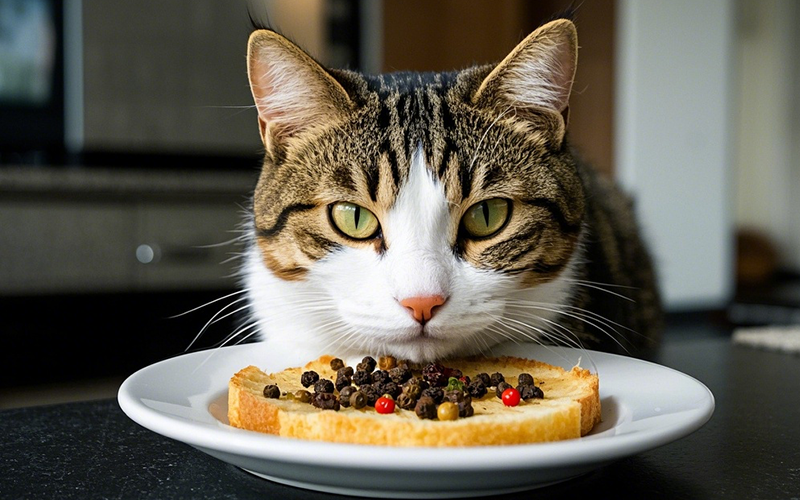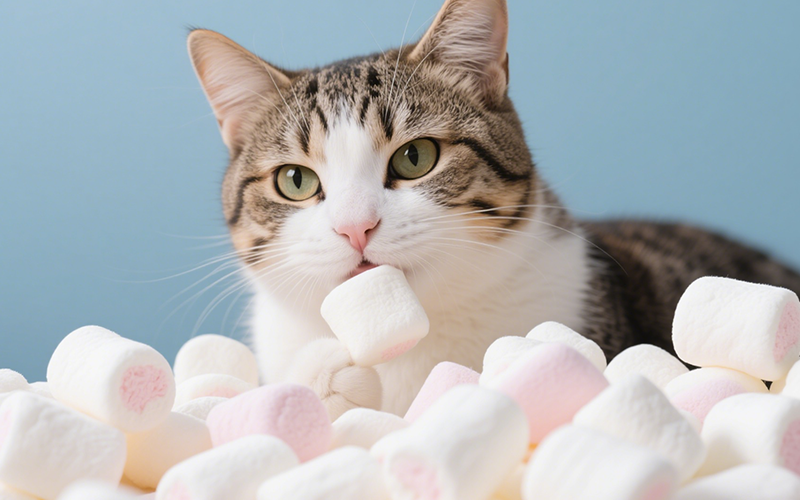Can Cats Eat Pepper? A Guide to Feeding Your Feline Spice
- 24 Mar 2025 14:25
Peppers are a popular vegetable for humans, whether they’re added to salads, cooked into dishes, or eaten raw as snacks. But when it comes to can cats eat pepper, the answer isn’t as simple as it seems. While peppers are not toxic to cats, there are several important factors to consider before offering them to your feline friend. Let’s take a closer look at whether peppers are a safe treat for your cat and what you should know. 🌶️🐱

Are Peppers Safe for Cats to Eat?
Yes, cats can eat peppers in small amounts, but they don’t necessarily offer much nutritional value for your feline friend. Here’s what you need to consider:
Non-Toxic: Peppers themselves—whether sweet bell peppers or mild chili peppers—are not toxic to cats. However, that doesn’t mean they’re the best food choice for your cat. 🌱
Nutrient Content: While peppers contain some vitamins (like vitamin C) and antioxidants, cats don’t really need these nutrients in their diet. Cats are obligate carnivores, which means their bodies thrive on animal protein rather than plant-based nutrients. 🐾
Mild in Spice: Sweet bell peppers (red, yellow, or green) are mild in flavor and generally not spicy. However, spicy chili peppers or hot peppers (like jalapeños or habaneros) can cause discomfort for cats and should never be given. Spicy foods can irritate your cat’s stomach and cause digestive upset. 🚫🌶️
Benefits of Peppers for Cats
Vitamin C: Peppers, especially red ones, are rich in vitamin C. While cats can produce their own vitamin C, this antioxidant can still support their immune system. However, this is not something you should rely on from peppers, as your cat's diet should primarily be meat-based. 🍅
Low in Calories: Peppers are low in calories and fat, making them a relatively healthy snack for humans. For cats, however, they should only be an occasional treat and not a staple food. 🥒
Fiber: The fiber in peppers can help with digestion, but cats don’t require the same level of fiber that humans do. Too much fiber could lead to digestive upset, including diarrhea or gas. 🐱💨
Risks of Feeding Peppers to Cats
Digestive Issues: Some cats may have difficulty digesting peppers, especially in larger amounts. Peppers are not a natural part of a cat's diet, and consuming too much can lead to stomach upset, including vomiting, diarrhea, or bloating. 💥
Spicy Peppers: Hot peppers or spicy chili peppers contain capsaicin, which can be extremely irritating to a cat’s digestive system. Even small amounts of spicy peppers can cause burning sensations, discomfort, or even serious health problems. Never feed your cat anything spicy or hot. 🌶️🔥
Choking Hazard: If you feed your cat large pieces of pepper, especially the skin or seeds, it can pose a choking hazard. Always ensure that any pepper you offer is cut into small, manageable pieces. 🧑🍳
Allergic Reactions: While rare, some cats may have allergies to certain vegetables, including peppers. This could result in skin rashes, itchiness, or digestive upset. Always watch for any unusual symptoms after introducing a new food. 👀
How to Safely Offer Peppers to Your Cat
If you decide to offer peppers to your cat, here’s how to do it safely:
Choose Sweet Peppers: Stick to sweet bell peppers (red, yellow, or green) that are mild in flavor. Avoid any spicy or hot varieties like jalapeños or habaneros. 🫑
Remove Seeds and Skin: Always remove the seeds and skin of the pepper. These parts can be hard for your cat to digest and may pose a choking hazard. 🐾
Serve in Small Portions: If you want to give your cat a taste of pepper, offer it in very small portions—just a small slice or piece. It should be a treat, not a regular part of their diet. 🍽️
Monitor for Reactions: After feeding your cat pepper, watch for any signs of digestive upset. If your cat experiences vomiting, diarrhea, or excessive drooling, stop feeding them pepper and consult a pet professional. 👀
Healthier Alternatives to Peppers for Cats
If you’re looking for healthier, more nutritious treats for your cat, here are some great alternatives:
Cooked Meat: Chicken, turkey, or beef are much better sources of protein for your cat. These meats should form the core of your cat’s diet. 🍗
Fish: Salmon or tuna are great sources of omega-3 fatty acids and protein, which support your cat’s skin, coat, and overall health. 🐟
Eggs: Scrambled or boiled eggs are an excellent protein-rich treat and are easier for cats to digest than vegetables. 🍳
Catnip: Catnip is a fun and safe treat that many cats enjoy. It can provide entertainment and mental stimulation without any health risks. 🌿
Commercial Cat Treats: Many commercial cat treats are formulated with the right nutrients your cat needs for a balanced diet. These are generally safer and more nutritious than human foods. 🧶
How PettureX Can Help with Your Cat’s Diet
If you're ever unsure about whether a particular food is safe for your cat, PettureX can help! With 24-hour online consultations and pet image recognition, PettureX offers personalized advice on what’s best for your cat’s health. 📱🐾
Conclusion
Can cats eat peppers? While peppers are not toxic to cats, they don’t provide the essential nutrients your cat needs and may cause digestive discomfort if eaten in excess. Sweet bell peppers are safe in small, occasional amounts, but avoid spicy peppers or those with added seasonings. Always remember to remove the seeds and skin and monitor your cat’s reaction to new foods.
For more personalized advice on your cat’s diet or any other health concerns, PettureX is always available to assist! 🌟🐱
Has your cat ever tried peppers? How did they like them? 😺
Related

Marshmallows and Cats: A Puffy Problem? Why Vets Say No to This Sugary Snack
- 22 Apr 2025
Kefir for Kitties? A Veterinarian-Reviewed Guide to Safety, Benefits & Risks
- 22 Apr 2025
The Burning Question: Can Cats Eat Jalapenos? A Comprehensive Safety Guide
- 21 Apr 2025
Cool Temptation: Can Cats Eat Ice Cream Safely? The Vet-Backed Truth
- 21 Apr 2025
Frankly Dangerous: Can Cats Eat Hot Dogs? Vet Explains the Serious Risks
- 16 Apr 2025
A Purrfect Protein? Can Cats Eat Ground Turkey Safely? (Vet-Reviewed Guide)
- 16 Apr 2025
Gritty Situation: Can Cats Eat Grits Safely? Vet Explains the Risks
- 16 Apr 2025
Gravy Danger Zone: Can Cats Eat Gravy Safely? (Vet-Reviewed Warning)
- 16 Apr 2025
Crunchy Query: Can Cats Eat Green Peppers? A Vet-Reviewed Safety Analysis
- 16 Apr 2025
Toxic Temptation: Can Cats Eat Grapefruit? Vet Explains the Dangers
- 16 Apr 2025
